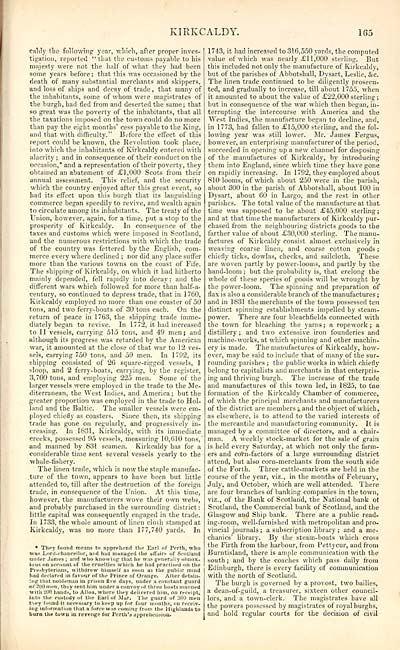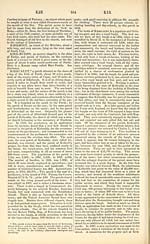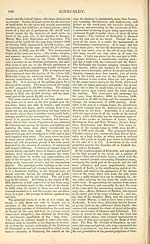Topographical, statistical, and historical gazetteer of Scotland > Volume 2
(177) Page 165
Download files
Complete book:
Individual page:
Thumbnail gallery: Grid view | List view

KIRKCALDY.
165
caldy the Followrng year, which, after proper inves-
tigation, reported "that the customs payable to his
majesty were not the half of what they had been
some years before ; that this was occasioned by the
death of many substantial merchants and skippers,
and loss of ships and decay of trade , that many of
the inhabitants, some of whom were magistrates of
the burgh, had fled from and deserted the same; that
so great was the poverty of the inhabitants, that all
the taxations imposed on the town could do no more
than pay the eight months' cess payable to the King,
and that with difficulty." Before the effect of this
report could be known, the Revolution took place,
into which the inhabitants of Kirkcaldy entered with
alacrity ; and in consequence of their conduct on the
occasion,* and a representation of their poverty, they
obtained an abatement of £1,000 Scots from their
annual assessment. This relief, and the security
which the country enjoyed after this great event, so
had its effect upon this burgh that its languishing
commerce began speedily to revive, and wealth again
to circulate among its inhabitants. The treaty of the
Union, however, again, for a time, put a stop to the
prosperity of Kirkcaldy. In consequence of the
taxes and customs which were imposed in Scotland,
and the numerous restrictions with which the trade
of the country was fettered by the English, com-
merce every where declined ; nor did any place suffer
more than the various towns on the coast of Fife.
The shipping of Kirkcaldy, on which it had hitherto
mainly depended, fell rapidly into decay; and the
different wars which followed for more than half-a-
century, so continued to depress trade, that in 1760,
Kirkcaldy employed no more than one coaster of 50
tons, and two ferry-boats of 30 tons each. On the
return of peace in 1763, the shipping trade imme-
diately began to revive. In 1772, it had increased
to 11 vessels, currying 515 tons, and 49 men; and
although its progress was retarded by the American
war, it amounted at the close of that war to 12 ves-
sels, carrying 750 tons, and 59 men. In 1792, its
shipping consisted of 26 square-rigged vessels, 1
sloop, and 2 ferry-boats, carrying, by the register,
3,700 tons, and employing 225 men. Some of the
larger vessels were employed in the trade to the Me-
diterranean, the "West Indies, and America ; but the
greater proportion was employed in the trade to Hol-
land and the Baltic. The smaller vessels were em-
ployed chiefly as coasters. Since then, its shipping
trade has gone on regularly, and progressively in-
creasing. In 1831, Kirkcaldy, with its immediate
creeks, possessed 95 vessels, measuring 10,610 tons,
and manned by 831 seamen. Kirkcaldy has for a
considerable time sent several vessels yearly to the
whale-rishery.
The linen trade, which is now the staple manufac-
.ture of the town, appears to have been but little
attended to, till after the destruction of the foreign
trade, in consequence of the Union. At this time,
however, the manufacturers wove their own webs,
and probably purchased in the surrounding district:
little capital was consequently engaged in the trade.
In 1733, the whole amount of linen cloth stamped at
Kirkcaldy, was no more than 177,740 yards. In
• They found moans to apprehend the Earl of Perth, who
was Lord-chancellor, and had managed ihe affairs uf Scotland
under James ; and who knowing that lie was generally obnox-
ious on account of the cruelties which he had practised on the
Presbyterians, withdrew himself as soon as the public mind
had declared in favour of the Prince of Orauge. Alter detain-
ing that nobleman in prison five days, under a constant guard
ot'SuOmen, they sent him under a convoy of three boats manned
with 200 hands, to Alloa, where they delivered him, on receipt,
into the custody of the Earl of Mar. The guard of 300 men
they found it necessary to keep up for four months, on receiv-
ing information that a force was coming from the Highlands to
burn the town ia revenge for Perth's anprehensiou.
1743, it had increased to 31 6,550 yards, the computed
value of which was nearly £11,000 sterling. But
this included not only the manufacture of Kirkcaldv,
but of the parishes of Abbotshall, Bysart, Leslie, &c.
The linen trade continued to be diligently prosecu-
ted, and gradually to increase, till about 1755, when
it amounted to about the value of £22,000 sterling ;
but in consequence of the war which then began, in-
terrupting the intercourse with America and the
West Indies, the manufacture began to decline, and,
in 1773, had fallen to £15,000 sterling, and the fol-
lowing year was still lower. Mr. James Fergus,
however, an enterprising manufacturer of the period,
succeeded in opening up a new channel for disposing
of the manufactures of Kirkcaldy, by introducing
them into England, since which time they have gone
on rapidly increasing. In 1792, they employed about
810 looms, of which about 250 were in the parish,
about 300 in the parish of Abbotshall, about 100 in
Dysart, about 60 in Largo, and the rest in other
parishes. The total value of the manufacture at that
time was supposed to be about £45,000 sterling;
and at that time the manufacturers of Kirkcaldy pur-
chased from the neighbouring districts goods to the
farther value of about £30,000 sterling. The manu-
factures of Kirkcaldy consist almost exclusively in
weaving coarse linen, and coarse cotton goods ;
chiefly ticks, dowlas, checks, and sailcloth. These
are woven partly by power-looms, and partly by the
hand-loom ; but the probability is, that erelong the
whole of these species of goods will be wrought by
the power-loom. The spinning and preparation of
flax is also a considerable branch of the manufactures ;
and in 1831 the merchants of the town possessed ten
distinct spinning establishments impelled by steam-
power. There are four bleachfields connected with
the town for bleaching the yarns ; a ropework ; a
distillery ; and two extensive iron founderies and
machine-works, at which spinning and other machin-
ery is made. The manufactures of Kirkcaldy, how-
ever, may be said to include that of many of the sur-
rounding parishes ; the public works in which chiefly
belong to capitalists and merchants in that enterpris-
ing and thriving burgh. The increase of the trade
and manufactures of this town led, in 1825, to t'ne
formation of the Kirkcaldy Chamber of commerce,
of which the principal merchants and manufacturers
of the district are members ;. and the object of which,
as elsewhere, is to attend to the varied interests of
the mercantile and manufacturing community. It is
managed by a committee of directors, and a chair-
man. A weekly stock-market for the sale of grain
is held every Saturday, at which not only the farm-
ers and corn-factors of a large surrounding district
attend, but also corn-merchants from the south side
of the Forth. Three cattle-markets are held in the
course of the year, viz., in the months of February,
July, and October, which are well attended. There
are four branches of banking companies in the town,
viz., of the Bank of Scotland, the National bank ot
Scotland, the Commercial bank of Scotland, and the
Glasgow and Ship bank. There are a public read-
ing-room, well-furnished with metropolitan and pro-
vincial journals; a subscription library ; and a me-
chanics' library. By the steam-boats which cross
the Firth from the harbour, from Pettycur, and from
Burntisland, there is ample communication with the
south ; and by the coaches which pass daily from
Edinburgh, there is every facility of communication
with the north of Scotland.
The burgh is governed by a provost, two bailies,
a dean-of-guild, a treasurer, sixteen other council-
lors, and a town-clerk. The magistrates have all
the powers possessed by magistrates of royal burghs,
and hold regular courts for the decision of civil
165
caldy the Followrng year, which, after proper inves-
tigation, reported "that the customs payable to his
majesty were not the half of what they had been
some years before ; that this was occasioned by the
death of many substantial merchants and skippers,
and loss of ships and decay of trade , that many of
the inhabitants, some of whom were magistrates of
the burgh, had fled from and deserted the same; that
so great was the poverty of the inhabitants, that all
the taxations imposed on the town could do no more
than pay the eight months' cess payable to the King,
and that with difficulty." Before the effect of this
report could be known, the Revolution took place,
into which the inhabitants of Kirkcaldy entered with
alacrity ; and in consequence of their conduct on the
occasion,* and a representation of their poverty, they
obtained an abatement of £1,000 Scots from their
annual assessment. This relief, and the security
which the country enjoyed after this great event, so
had its effect upon this burgh that its languishing
commerce began speedily to revive, and wealth again
to circulate among its inhabitants. The treaty of the
Union, however, again, for a time, put a stop to the
prosperity of Kirkcaldy. In consequence of the
taxes and customs which were imposed in Scotland,
and the numerous restrictions with which the trade
of the country was fettered by the English, com-
merce every where declined ; nor did any place suffer
more than the various towns on the coast of Fife.
The shipping of Kirkcaldy, on which it had hitherto
mainly depended, fell rapidly into decay; and the
different wars which followed for more than half-a-
century, so continued to depress trade, that in 1760,
Kirkcaldy employed no more than one coaster of 50
tons, and two ferry-boats of 30 tons each. On the
return of peace in 1763, the shipping trade imme-
diately began to revive. In 1772, it had increased
to 11 vessels, currying 515 tons, and 49 men; and
although its progress was retarded by the American
war, it amounted at the close of that war to 12 ves-
sels, carrying 750 tons, and 59 men. In 1792, its
shipping consisted of 26 square-rigged vessels, 1
sloop, and 2 ferry-boats, carrying, by the register,
3,700 tons, and employing 225 men. Some of the
larger vessels were employed in the trade to the Me-
diterranean, the "West Indies, and America ; but the
greater proportion was employed in the trade to Hol-
land and the Baltic. The smaller vessels were em-
ployed chiefly as coasters. Since then, its shipping
trade has gone on regularly, and progressively in-
creasing. In 1831, Kirkcaldy, with its immediate
creeks, possessed 95 vessels, measuring 10,610 tons,
and manned by 831 seamen. Kirkcaldy has for a
considerable time sent several vessels yearly to the
whale-rishery.
The linen trade, which is now the staple manufac-
.ture of the town, appears to have been but little
attended to, till after the destruction of the foreign
trade, in consequence of the Union. At this time,
however, the manufacturers wove their own webs,
and probably purchased in the surrounding district:
little capital was consequently engaged in the trade.
In 1733, the whole amount of linen cloth stamped at
Kirkcaldy, was no more than 177,740 yards. In
• They found moans to apprehend the Earl of Perth, who
was Lord-chancellor, and had managed ihe affairs uf Scotland
under James ; and who knowing that lie was generally obnox-
ious on account of the cruelties which he had practised on the
Presbyterians, withdrew himself as soon as the public mind
had declared in favour of the Prince of Orauge. Alter detain-
ing that nobleman in prison five days, under a constant guard
ot'SuOmen, they sent him under a convoy of three boats manned
with 200 hands, to Alloa, where they delivered him, on receipt,
into the custody of the Earl of Mar. The guard of 300 men
they found it necessary to keep up for four months, on receiv-
ing information that a force was coming from the Highlands to
burn the town ia revenge for Perth's anprehensiou.
1743, it had increased to 31 6,550 yards, the computed
value of which was nearly £11,000 sterling. But
this included not only the manufacture of Kirkcaldv,
but of the parishes of Abbotshall, Bysart, Leslie, &c.
The linen trade continued to be diligently prosecu-
ted, and gradually to increase, till about 1755, when
it amounted to about the value of £22,000 sterling ;
but in consequence of the war which then began, in-
terrupting the intercourse with America and the
West Indies, the manufacture began to decline, and,
in 1773, had fallen to £15,000 sterling, and the fol-
lowing year was still lower. Mr. James Fergus,
however, an enterprising manufacturer of the period,
succeeded in opening up a new channel for disposing
of the manufactures of Kirkcaldy, by introducing
them into England, since which time they have gone
on rapidly increasing. In 1792, they employed about
810 looms, of which about 250 were in the parish,
about 300 in the parish of Abbotshall, about 100 in
Dysart, about 60 in Largo, and the rest in other
parishes. The total value of the manufacture at that
time was supposed to be about £45,000 sterling;
and at that time the manufacturers of Kirkcaldy pur-
chased from the neighbouring districts goods to the
farther value of about £30,000 sterling. The manu-
factures of Kirkcaldy consist almost exclusively in
weaving coarse linen, and coarse cotton goods ;
chiefly ticks, dowlas, checks, and sailcloth. These
are woven partly by power-looms, and partly by the
hand-loom ; but the probability is, that erelong the
whole of these species of goods will be wrought by
the power-loom. The spinning and preparation of
flax is also a considerable branch of the manufactures ;
and in 1831 the merchants of the town possessed ten
distinct spinning establishments impelled by steam-
power. There are four bleachfields connected with
the town for bleaching the yarns ; a ropework ; a
distillery ; and two extensive iron founderies and
machine-works, at which spinning and other machin-
ery is made. The manufactures of Kirkcaldy, how-
ever, may be said to include that of many of the sur-
rounding parishes ; the public works in which chiefly
belong to capitalists and merchants in that enterpris-
ing and thriving burgh. The increase of the trade
and manufactures of this town led, in 1825, to t'ne
formation of the Kirkcaldy Chamber of commerce,
of which the principal merchants and manufacturers
of the district are members ;. and the object of which,
as elsewhere, is to attend to the varied interests of
the mercantile and manufacturing community. It is
managed by a committee of directors, and a chair-
man. A weekly stock-market for the sale of grain
is held every Saturday, at which not only the farm-
ers and corn-factors of a large surrounding district
attend, but also corn-merchants from the south side
of the Forth. Three cattle-markets are held in the
course of the year, viz., in the months of February,
July, and October, which are well attended. There
are four branches of banking companies in the town,
viz., of the Bank of Scotland, the National bank ot
Scotland, the Commercial bank of Scotland, and the
Glasgow and Ship bank. There are a public read-
ing-room, well-furnished with metropolitan and pro-
vincial journals; a subscription library ; and a me-
chanics' library. By the steam-boats which cross
the Firth from the harbour, from Pettycur, and from
Burntisland, there is ample communication with the
south ; and by the coaches which pass daily from
Edinburgh, there is every facility of communication
with the north of Scotland.
The burgh is governed by a provost, two bailies,
a dean-of-guild, a treasurer, sixteen other council-
lors, and a town-clerk. The magistrates have all
the powers possessed by magistrates of royal burghs,
and hold regular courts for the decision of civil
Set display mode to: Large image | Transcription
Images and transcriptions on this page, including medium image downloads, may be used under the Creative Commons Attribution 4.0 International Licence unless otherwise stated. ![]()
| Gazetteers of Scotland, 1803-1901 > Topographical, statistical, and historical gazetteer of Scotland > Volume 2 > (177) Page 165 |
|---|
| Permanent URL | https://digital.nls.uk/97450714 |
|---|
| Description | Volume second: I-Z. |
|---|---|
| Shelfmark | Map Room Ref.2 |
| Attribution and copyright: |
|

